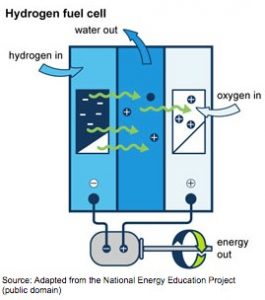ADVANTAGES
WHAT ARE SOME OF THE ADVANTAGES OF HYDROGEN AS AN ENERGY SOURCE?
Hydrogen is attractive as an alternative transportation fuel due to: its ability to power fuel cells in zero-emission fuel cell electric vehicles (FCEVs); its potential for domestic production; its fast filling time; and the fuel cell's high efficiency - a fuel cell coupled with an electric motor is two to three times more efficient than an internal combustion engine running on gasoline.[1]
Gasoline and diesel vehicles emit pollutants such as nitrogen oxides, hydrocarbons, and particulate matter. Hydrogen-powered fuel cell electric vehicles emit none of these—only water (H2O) and warm air.[2]
Source: U.S. Energy Information Administration, 2022[3]
The benefits of hydrogen are further captured in the following:
- Energy Security
Hydrogen can be produced domestically from resources like natural gas, coal, solar energy, wind, and biomass. When used to power highly efficient fuel cell electric vehicles, hydrogen holds the promise of helping conserve petroleum and diversifying our transportation energy options.[4,5]
- Public Health and Environment
About half of the U.S. population lives in areas where air pollution levels are high enough to negatively impact public health and the environment. Emissions from gasoline and diesel vehicles—such as nitrogen oxides, hydrocarbons, and particulate matter—are a major source of this pollution. Hydrogen-powered fuel cell electric vehicles emit none of these harmful substances—only water (H2O) and warm air.[6]
The environmental and health benefits are also seen at the source of hydrogen production if derived from low- or zero-emission sources, such as solar, wind, and nuclear energy and fossil fuels with advanced emission controls and carbon sequestration. Because the transportation sector accounts for about one-third of U.S. carbon dioxide emissions, using these sources to produce hydrogen for transportation can cut greenhouse gas emissions. Learn more about hydrogen emissions.[7]
- Hydrogen for Electric Power
Natural gas is currently the most used fuel for production of electricity in the United States and is expected to continue through the 2040s. However, natural gas when burned to produce electric power results in various emissions such as carbon dioxide. Hydrogen, when burned in the presence of oxygen, produces only water as a by-product. Because of this, hydrogen can be used to decarbonize the electric power sector. Combustion turbines capable of burning hydrogen can be utilized to increase power generation on a large scale and could replace natural gas-fired generation.[8]
Updated June 2022 by Erin Bennett


Comments are closed.